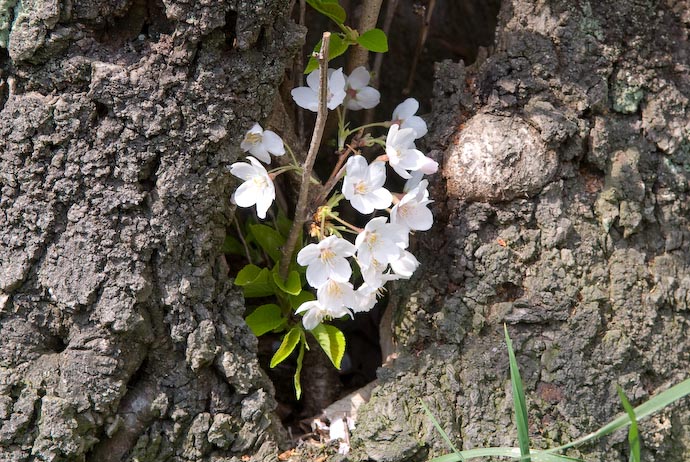
Nikon D200 + Nikkor 17-55 f/2.8 @ 55mm — 1/1000 sec, f/2.8, ISO 200 — map & image data — nearby photos
Everyone's Favorite Weed
While viewing the amazing cherry blossoms in northern Kyoto last month, despite all the attention on the blossoms, there were plenty of other botanical signs of spring, and I took a moment away from the blossoms to enjoy them as well.
In an earlier post, I showed some of Kyoto's brilliant spring colors, but those of today's posts are a bit more subtle. Among the weeds around the little river that flowed through the area were a number of different flowers....

Nikon D200 + Nikkor 17-55 f/2.8 @ 55mm — 1/750 sec, f/4.5, ISO 200 — map & image data — nearby photos
Little White Flowers

Nikon D200 + Nikkor 17-55 f/2.8 @ 55mm — 1/250 sec, f/8, ISO 200 — map & image data — nearby photos
Budding Pink Something-or-Others
(The leaves make me wonder whether these aren't early azaleas, which recently exploded into bloom)

Nikon D200 + Nikkor 17-55 f/2.8 @ 55mm — 1/200 sec, f/5.6, ISO 200 — map & image data — nearby photos
Little Purple Flowers

Nikon D200 + Nikkor 17-55 f/2.8 @ 38mm — 1/640 sec, f/5.6, ISO 200 — map & image data — nearby photos
Limbs Laden Little White Flowers
Out of focus behind the white flower above were scraggly bushes with pink blossoms of some kind or another....

Nikon D200 + Nikkor 17-55 f/2.8 @ 55mm — 1/2500 sec, f/4, ISO 200 — map & image data — nearby photos
Little Pink Blossoms
The bushes heavily laden with little white flowers could be quite large and impressive, even among the cherry blossoms at full glory. Here's a larger bush of them where the small river empties into the big cherry-blossom-lined Takano River, half a mile away.

Nikon D200 + Nikkor 17-55 f/2.8 @ 55mm — 1/640 sec, f/7.1, ISO 200 — map & image data — nearby photos
Big Bush of White

Nikon D200 + Nikkor 17-55 f/2.8 @ 44mm — 1/500 sec, f/7.1, ISO 200 — map & image data — nearby photos
Spring Leaves Spring Leaves Before Spring Leaves
(Parse that if you can! 🙂 )
The new leaves of a deciduous tree have their own richly-green beauty, especially when contrasted to the heavenly-delicate white of the surrounding cherry blossoms.
But in the end, it was a day for cherry blossoms, so I'll end with another shot of an epicormic shoot of cherry blossoms, at ground level, in a crevice of an old tree.

Nikon D200 + Nikkor 17-55 f/2.8 @ 55mm — 1/160 sec, f/9, ISO 200 — map & image data — nearby photos
Epicormic Blossoms
Years ago I wrote an article about plant-hunting on Yakushima, and received a delightful letter from an elderly American botanist who’d explored there years before: “I read your Yakushima story with exceptional and vicarious pleasure…” – and that’s exactly how I enjoy your blog – and not just the plant photographs.
That’s very kind praise, thank you. I have to say, though, that while I enjoy pretty flowers like anyone else, hearing of your enjoyment is the greater vicarious pleasure for me. Just because of your one comment some time ago, I found myself enjoying photographing flowers more. —Jeffrey
These plants: well, ‘Everyone’s favorite weed’ is a sow-thistle, Sonchus oleraceus, not a dandelion as you may have thought. By the way, have you some across the white-flowered dandelions in Japan? They are not common, I think, in fact I only saw them in South Korea, but they are quite a novelty!
They really look like dandelions to me (tanpopo 蒲公英 in Japanese). Of course, my greatest botanical feat is to differentiate between an orange and a tangerine, so perhaps I should take your word for it. 🙂
The three shrubs with little white flowers are a Spiraea, perhaps S. thunbergii (for Carl Thunberg, wrote an early treatise on Japanese plants, ‘Flora Japonica’, in 1784).
Including those in the “Little White Flowers” picture? I didn’t realize that they were the same.
You’re bang-on with the azalea!
Little purple flower: periwinkle (Vinca major, not a Japanese plant).
Little pink: a flowering quince, Chaenomeles speciosa I think, a cultivated variety
By the way, the Edgeworthia is 三椏 in Japanese (lit. “three tree joints”), according to Edict: the name may mean something to you or to Fumie. I think it refers to the tendency to branch into three at each joint. Edgeworthia is quite closely related to daphnes which are well-known in Western gardens.
Thanks so much, Peter… you don’t disappoint! —Jeffrey
We are a community newspaper in Clayton, CA. Our garden columnist wrote on the flowering quince for the upcoming issue and we would like to request permission to use the flowering quince photo on this blog page to illustrate her column. We will give full credit including your Website.
Please let me know ASAP – by tomorrow afternoon, 2/15, end of day, as we are under deadline.
Thank you
Tamara Steiner, Publisher
Clayton Pioneer
925-672-0500